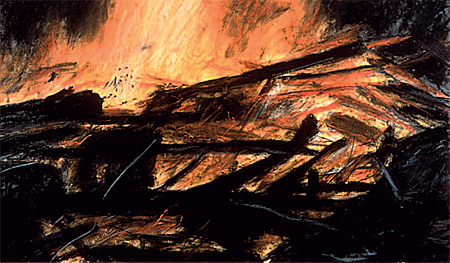To Eshun, the whole world was kindling—peasants rebelling against harsh conditions only to be tortured and executed, constant battles between samurai bands, a broken court, endless poverty and endless greed.
Eshun never married, refusing to even consider it. Her older brother, Ryoan Emyo, was a well-known monk who founded the temple Saijoji. When Eshun was past thirty, she went to Saijoji and asked her brother to ordain her. He refused.
“If I ordained you or other women, the monks would be corrupted by your presence,” he said. Eshun was a beautiful woman; he didn’t have much faith in the men he trained.
“This life is only for the daijobu ones,” he added. Daijobu means the same as ta-cheng-fu—heroic, noble, grand. Manly.
Eshun went home and cut off her hair. Then she picked up a hot poker from the kitchen fire and scarred her face in several places. She put on plain clothes and returned to the monastery to see her brother. When he saw her this way, he relented and allowed her to practice there.
Eshun was single-minded and strong, else she would have been married long before. She beat many of the monks in debates, sometimes humiliating them badly by the subtlety of her answers. But they couldn’t keep from harassing her with their attentions. Even with her scarred face and bald head, even in plain monk’s clothing, she was irresistible. The men couldn’t control themselves around her, and several had to be expelled for their behavior.
When a special congress was to be held at the Engakuji temple, none of the monks from Saijoji were willing to go. Engakuji housed more than a thousand monks by then and had a fierce reputation. Many people feared going there because of stories about how badly visitors were treated. Finally, her brother appointed Eshun as his representative. She was well known in Zen circles by then, and when the Engakuji monks heard she was coming, they decided to frighten her with a trick.
The day of the congress she climbed the long, wide steps and walked through the great gate. A monk jumped out from behind a rock, threw his robes open, and exposed himself, shouting, “My monk’s thing is three feet long! How about taking it on?” Eshun immediately threw open her nun’s robes and answered, “This nun’s thing has no bottom.” All the monks watching from their hiding places were embarrassed and skulked away.
Even the abbot at Engakuji mistreated her. He invited her to his room for tea and then served it to her in his washing bowl. She merely handed the tea back to him, saying, “No, honored abbot, you must use your own bowl.”
One young monk at Saijoji fell madly in love with Eshun and constantly sent her love letters, slipping them under her meditation cushion and into the sleeves of her robes. Finally she sent him a note saying that their meeting would have to be secret because they were under vows of celibacy. When she passed him in the hall that afternoon, she whispered, “I’ll fix a time and place, and tell you.” She passed quickly on before he could answer.
A few days later the entire community was gathered in the meditation hall for a Dharma talk. Eshun came in last, completely naked. All the monks watched her in stupefaction while she walked calmly down the center aisle until she reached her admirer.
“Well?” she asked, in a loud voice. “If you really love me, take me now! It’s nothing to be ashamed of, is it?” He leapt from his seat, ashamed, and ran away from the monastery forever. After that, Eshun was mostly left alone.
When Eshun was old and getting close to death, she asked several monks to make a woodpile for a bonfire in her yard. To their shock, she then sat down in the center and set fire to it.
Her brother rushed out of his room and up to the edge of the flames, but they were too intense. Through the blinding hot light, he could see her sitting in perfect stillness.
“My sister!” he shouted. She turned her head slowly. The skin on her face and hands was beginning to bubble and split.
“Is it hot in there?” he said, and they both knew what he meant. She was going to a place where nothing is hot or cold.
“For one living in the Way,” she answered, her voice just carrying over the crackle of flames and popping wood, “hot and cold are nothing to fear. There is no need to ask that question.”
And then she burned to death, following her beauty into emptiness.
♦
Excerpted from Women of the Way: Discovering 2,500 Years of Buddhist Wisdom by Sallie Tisdale (HarperSanFrancisco, March 2006)
Thank you for subscribing to Tricycle! As a nonprofit, we depend on readers like you to keep Buddhist teachings and practices widely available.
